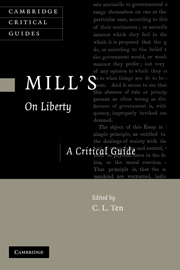Book contents
- Frontmatter
- Contents
- List of contributors
- Mill's On Liberty: Introduction
- 1 Mill's case for liberty
- 2 Mill's liberal principles and freedom of expression
- 3 Racism, blasphemy, and free speech
- 4 State neutrality and controversial values in On Liberty
- 5 Rawls's critique of On Liberty
- 6 Mill on consensual domination
- 7 Autonomy, tradition, and the enforcement of morality
- 8 Mill and multiculturalism
- 9 Mill, liberty, and (genetic) “experiments in living”
- 10 John Stuart Mill, Ronald Dworkin, and paternalism
- Bibliography
- Index
7 - Autonomy, tradition, and the enforcement of morality
Published online by Cambridge University Press: 01 July 2009
- Frontmatter
- Contents
- List of contributors
- Mill's On Liberty: Introduction
- 1 Mill's case for liberty
- 2 Mill's liberal principles and freedom of expression
- 3 Racism, blasphemy, and free speech
- 4 State neutrality and controversial values in On Liberty
- 5 Rawls's critique of On Liberty
- 6 Mill on consensual domination
- 7 Autonomy, tradition, and the enforcement of morality
- 8 Mill and multiculturalism
- 9 Mill, liberty, and (genetic) “experiments in living”
- 10 John Stuart Mill, Ronald Dworkin, and paternalism
- Bibliography
- Index
Summary
INTRODUCTION
John Stuart Mill is committed to a utilitarian and liberal theory of human nature and the good. His theory of value is meshed with a liberal philosophy of education that is dedicated to encouraging a process of self-development. Mill's utilitarianism and liberalism are also strongly influenced by the philosophical tradition of virtue ethics and politics. One sign of the link is Mill's advocacy of a kind of liberal education designed to develop the core intellectual and moral excellences in childhood. Mill's liberalism also champions democratic social and political institutions that have as one major goal to provide institutional support for life-long pursuits of these excellences. Mill's many discussions of the educational processes of development and self-development can be seen as setting out a plan for inculcating these mental and moral virtues. The program of education in self-development aims to train human traits of reason, emotion, and sympathy as well as higher-order capacities of autonomy, individuality, sociality, and compassion. Mill is a liberal egalitarian, but he appreciates the Greeks and their virtue-ethical conception of a good human life as including essentially training in and habituation to these excellences.
Autonomy and individuality have pride of place in Mill's conception of human excellence. The two virtues are connected, for in Mill's theory one prime task of autonomy is to develop an individuality or identity that is authentic for each person. Mill professes liberal autonomy. Mill's liberal autonomy features the core abilities of self-determination, critical reflection, and authenticity.
- Type
- Chapter
- Information
- Mill's On LibertyA Critical Guide, pp. 138 - 164Publisher: Cambridge University PressPrint publication year: 2009
- 3
- Cited by



